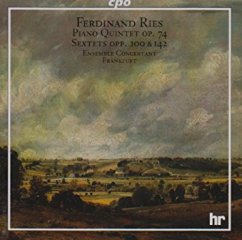Ferdinand Ries: Piano Quintet Op.74 - Sextets Op.100 & 142 (2001)
Ferdinand Ries: Piano Quintet Op.74 - Sextets Op.100 & 142 (2001)

Quintet op. 74 in B minor (1815) 20'38 for Violin, Viola, Violoncello, Double Bass, and Piano (1) Grave - Allegro con brio 9'26 (2) Larghetto 4'58 (3) Rondo: Allegro 6'14 Grand Sextuor op. 100 in C major (1817) 23'16 for 2 Violins, Viola, Violoncello, Double Bass, and Piano (4) Allegro con brio 10'19 (5) Andante - Air irlandois Andante 6'11 (The lost Rose of Summer) (6) Adagio - Allegro 6'46 Sextet op.142 in G minor (1814) 20'19 for Harp, Piano, Clarinet, Bassoon, Horn, and Double Bass (7) Allegro non troppo 9'09 (8) Adagio con moto 4'41 (9) Rondo: Allegretto 6'29 Ensemble Concertant Frankfurt: Peter Agoston, 1st Violin Klaus Schwamm, 2nd Violin Fred Günther, Viola Sabine Krams, Violoncello Timm-Johannes Trappe, Double Bass Fritz Walther, Piano Charlotte Cassedanne-Yoran, Harp Uli Mehlhardt, Clarinet Christian Lampert, Horn Wolfgang Buttler, Bassoon
After a string of failed attempts to establish himself as a pianist and composer in the capitals of Europe, Ferdinand Ries was brought to London in 1813 by the same impresario who had imported Haydn 20 years earlier, Johann Peter Salomon. All three works were written during this time in England while Ries enjoyed the favor of the upper classes and looked for a wife. Presumably, he composed these works for himself on piano with the other parts to be played by wealthy amateurs. The pedestrian string writing in the first two works substantiates the premise that they were composed for London's dilettantes.
The Quintet in B Minor, Op.74 has the same unusual instrumentation as Schubert's 'Trout' Quintet, which was published 4 years later, a piano backed by a violin, viola, cello and double bass. With its walking bass line, elastic rhythmic shifts and kaleidoscopic harmonic changes, the first movement `Grave' sounds quite contemporary, like something from a piano jazz bar. A sweetly sounding violin opens the following `Larghetto' before the piano assumes center stage once more. Hushed pizzicato strings provide a delicate backdrop for the sprightly piano in one memorable section of the concluding `Rondo'.
Ries' exploration of unusual instrumentation combinations continues in the Grand Sextet in C Major, Op.100. A piano join the string quintet lineup used by George Onslow among, a double bass uniting with a string quartet. Despite being the only work on the recording that is not in a minor key, the Grand Sextet has a somber mood, slipping into A Minor after only 2 measures of the opening 'Allegro'. Heroic, bravura piano passages alternate with softer, elegiac interludes to showcase the range of the assured, confidant playing of Fritz Walter. After a solemn 2nd movement, the playfulness of the final `Adagio' is a welcome contrast.
While the high opus number of the Sextet in G Minor, Op.142 may lead to the conclusion that it was written late in Reis' life, the opposite is actually true. He simply couldn't find a publisher willing to take a chance on a work composed for harp, piano, clarinet, bassoon, horn and double bass. Finally published in 1826, 12 years after being written, it is the high point of the CD, contemplative, melancholic and quite beautiful.
The ethereal opening of the harp signals that this is a very different composition. In the two other works, the melodic weightlifting was the sole domain of the piano. Not so here. First the harp, then the clarinet, then the keyboard and horn, and eventually even the bassoon all take turns with graceful, singing lines in the opening `Allegro non troppo'. Flowing, overlapping melodic phrases dominate the pensive second movement `Adagio con moto' before giving way to a brisk `Rondo'. Once more, the piano leads the ensemble, but this time steps aside to allow other instruments to shine, particularly Uli Mehlhardt on clarinet and Christian Lampert on horn.
The CPO recording is up to the usual high standards, effectively balancing spaciousness with immediacy. Of particular note are the elasticity and fluid tempos employed by the Ensemble Concertant Frankfurt, which permits Ries' music to sparkle like the jewels that they are. --- bejart7092, amazon.com
download (mp3 @320 kbs):
yandex mediafire uloz.to mega 4shared cloudmailru gett








